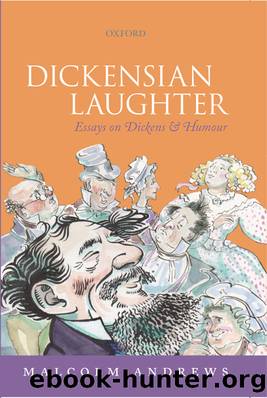Dickensian Laughter by Malcolm Andrews;

Author:Malcolm Andrews;
Language: eng
Format: epub
Publisher: OUP Premium
Published: 2013-05-14T16:00:00+00:00
5
Falling Apart Laughing
We use several expressions to indicate our sense that laughter undoes the self. People âcollapse in laughterâ, or they âfall apart laughingâ; they âsplit their sidesâ and âburst outâ laughing. âPull yourself together!â can be the reprimand for someone helpless in the throes of laughter. The self has somehow disintegrated temporarily, and recovery of composure is, idiomatically, to take the form of reconstituting that self as a single compact unit. Laughter benignly threatens individuality; the corollary is that it promotes merging. Laughterâs unrestrained physical demonstration of enjoyment has two effects: it disarms the normal reserves, producing a kind of collapse (âfalling apartâ), and it stimulates and liberates others to share that enjoyment. In this essay I am exploring the former effect, and in the following essay the latter.
Dickens often uses the motif of collapse and disintegration to secure his laughter, which is itself an experience of near collapse. But what exactly is collapsing in such scenarios in Dickensâs fiction? Very often it happens in a climactic exposure scene which entails the undoing of an individual, particularly when that individual has developed a distinctive façade to protect his true identity, as in the case of a hypocrite (Pecksniffâs come-uppance is a fine example). The laughter at the crumbling of a deceitful façade is partly joyful triumph at a well-deserved retribution. But it can go deeper than this, beyond the dropping of the hypocritical mask, because there can be something comical, perhaps comical-grotesque, in the abrupt unravelling of the jealously guarded single self. At this point, and before concentrating on Dickensâs scenarios, I would like to draw in some ideas from two theorists who were particularly concerned with the constitution of selfhood, fragmentation and hybridityâJacques Lacan and Mikhail Bakhtin. What they suggest about the factitiousness and fragility of the unified self, and the terms they use to describe its defensive strategies, help to illuminate the disintegrative power of laughter.
Download
This site does not store any files on its server. We only index and link to content provided by other sites. Please contact the content providers to delete copyright contents if any and email us, we'll remove relevant links or contents immediately.
Anxious People by Fredrik Backman(2564)
The Last Thing He Told Me by Laura Dave(2199)
The Soulmate Equation by Christina Lauren(1923)
Not a Happy Family by Shari Lapena(1611)
Romancing Mr. Bridgerton (Bridgerton 04) by Julia Quinn(1521)
Slough House by Mick Herron(1443)
Life's Too Short by Abby Jimenez(1435)
The Switch by Beth O'Leary(1393)
Kiss My Cupcake by Helena Hunting(1380)
Solutions and Other Problems by Allie Brosh(1318)
Mordew by Alex Pheby(1271)
This Time Next Year by Sophie Cousens(1193)
A Rogue of One's Own by Evie Dunmore(1119)
No One Is Talking About This by Patricia Lockwood(1091)
The Mary Shelley Club by Goldy Moldavsky(1054)
Playing Nice by JP Delaney(1043)
Roadside Picnic by Arkadi & Boris Strugatsky(1042)
Squeeze Me: A Novel by Carl Hiaasen(1012)
American Psycho (Vintage Contemporaries) by Bret Easton Ellis(995)
